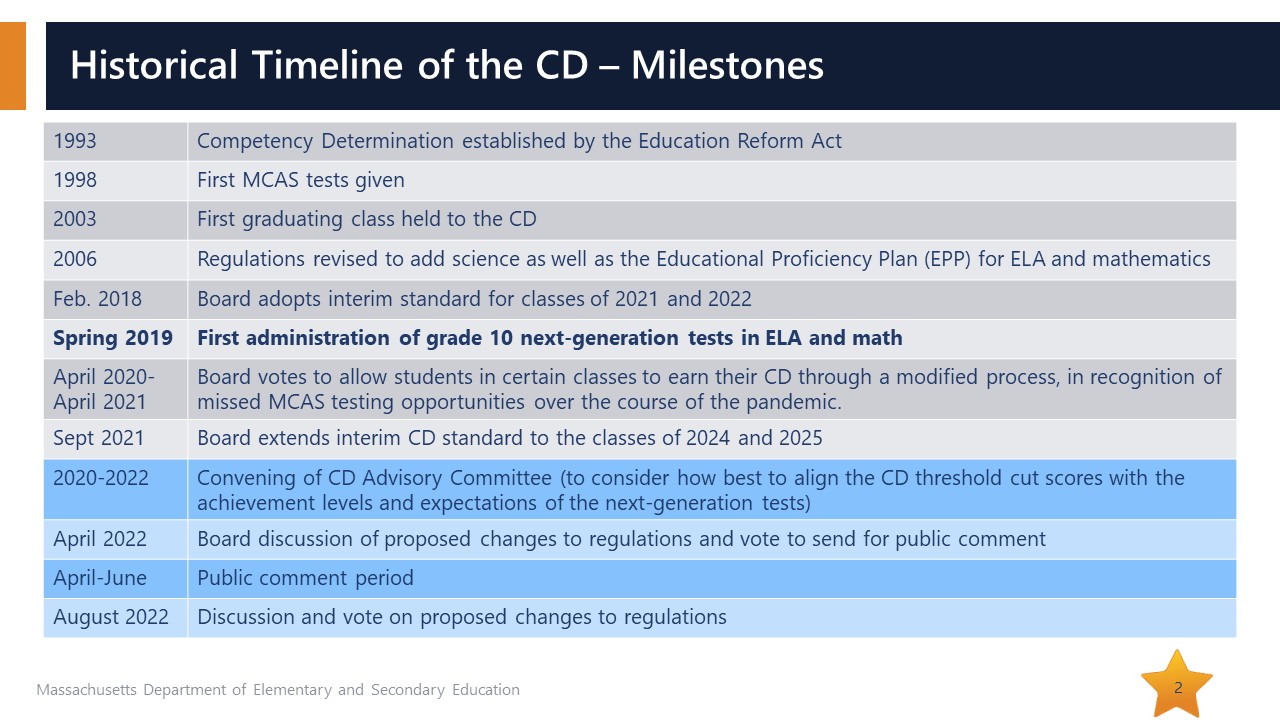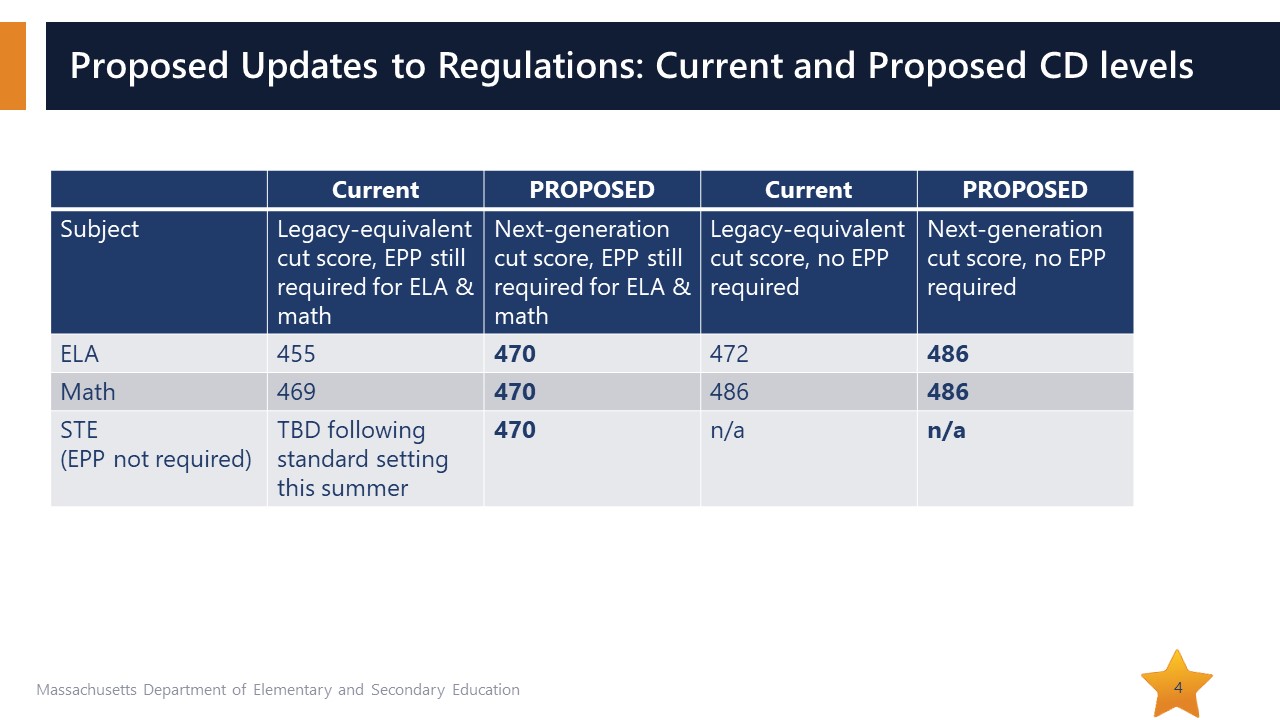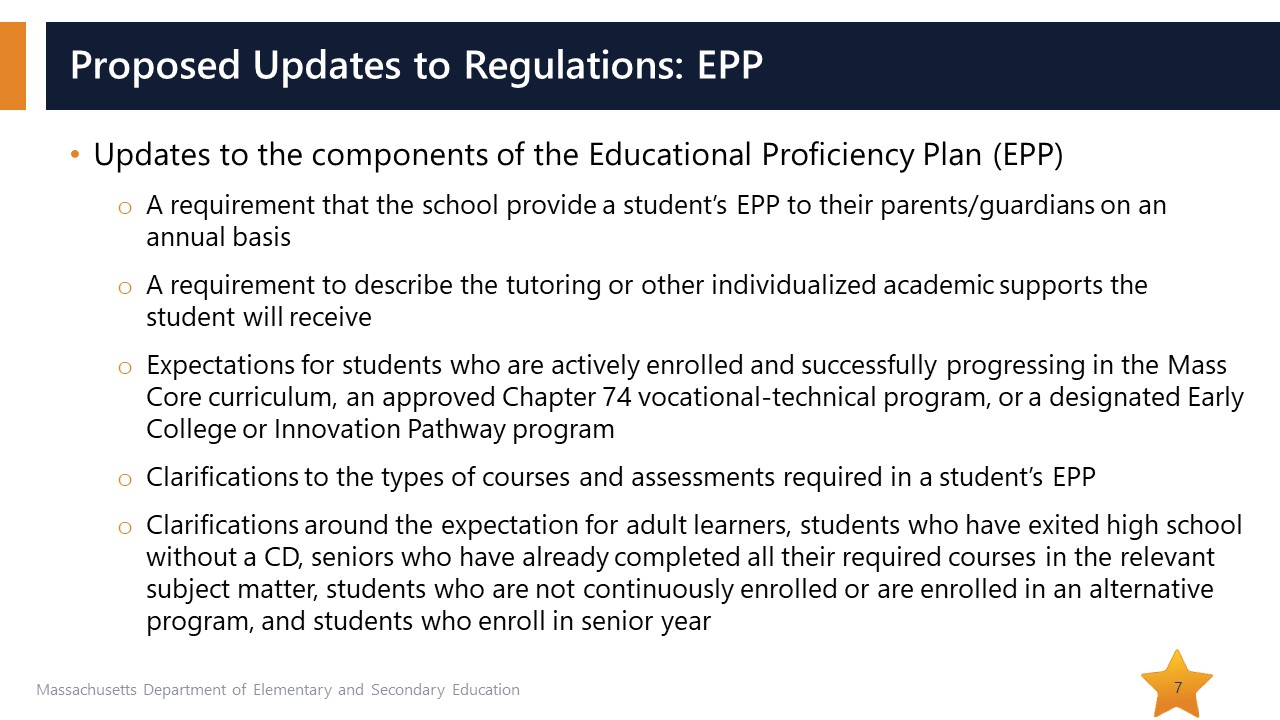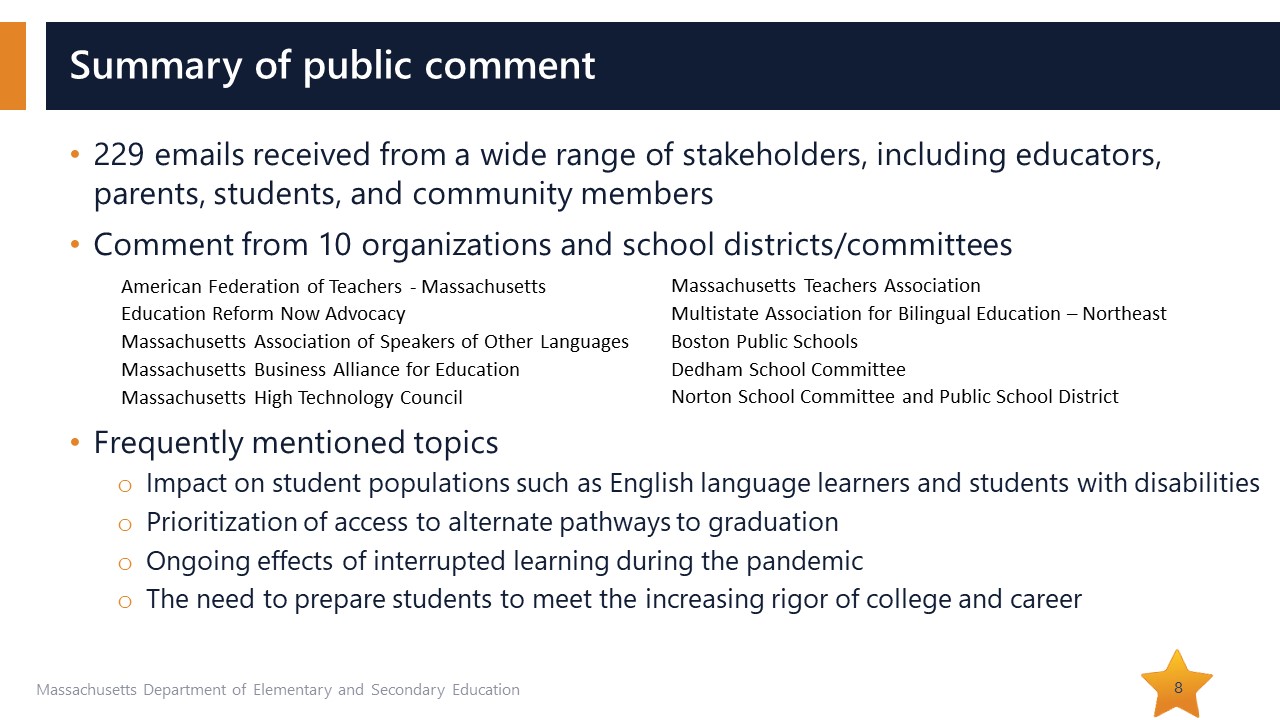
Search
Special August meeting of the Board of Elementary and Secondary Education
- Details
- Published on Saturday, 20 August 2022 19:30
The Board of Elementary and Secondary Education held a special meeting on Monday, August 15 at noon. The agenda can be found here; the video of the meeting is here.
The Board opened with public comment, much of which focused on the proposal to raise the MCAS score required to fulfill the state's competency determination for high school graduation.
The first speakers were Senators Jo Comerford and Patricia Jehlen and Representative Jim Hawkins. Comerford opened by listing various supports the state has given to districts "to meet the moment...at a time when there has been incalculable harm to students." She spoke of the systemic challenges "that individual students will pay for." Hawkins, noting his background as a 10th grade math teacher, said his concern was for students who might end up in remedial courses. Jehlen said it was students who don't yet read or write English fluently most likely to be impacted; she spoke of her concern over the potential for this to increase the likelihood such students will drop out, will not be able to attend college, join the military, or certificate programs. She said that they will not get the skills they need from remediating for the test, closing, ""please don't raise this barrier to their success."
Speaking next were MTA President Max Page and MTA Vice President Deb McCarthy. Page opened by saying that, while others no doubt would do so, he was "not here to plead with you against a vote to raise MCAS scores; you already made pretty clear in public and no doubt in private meetings that you intend to do so." He said of the Board "you've fetishized an approach to education that is the very least outdated, and at the most destructive of our schools and communities." He said, "It struck me that we have a fundamental difference on the purpose of what schools are for" and that he and others will be here...for as long as it takes to tear down the system that you're perpetuating." McCarthy cited Mother Jones and the Children's Crusade in her remarks, which also spoke of the fifth graders she taught last year. She said that they spent 65% of their school year "on the repetitive drills of a multiple choice test" with 18 days spent on Galileo testing and 6 on MCAS. She said it was time to stop testing used for "creating a two tiered educational system in this Commonwealth."
Joe Herosy read a letter from Barbara Rose of Hudson who was on the Hudson School Committee, who questioned both the relevance of the test and if there was any data that supported raising scores.
Sarah Bol, a special education teacher in New Bedford, noted that students are struggling, and said "having a conversation about raising educational standards and having a discussion about raising MCAS scores" are two different things."
Lisa Graf spoke on the budget update on the agenda, requesting that the state support, listing, among much else, HVAC upgrades and outdoor spaces for meals, pool testing, rapid testing, vaccination deployment, and high quality masks. Both during Ms. Graf's remarks and earlier in the meeting, there was a disruption in the room.
In opening the meeting, Chair Katherine Craven welcomed three new members to the Board: new student representative Eric Plankey of Westford, and newly appointed members Farzana Mohamed of Newton
and Tricia Canavan of South Hadley. She thanked the two prior members, James Morton and Amanda Fernández, for their service to the Board.
Secretary James Peyser noted several state actions recently: inclusive concurrent enrollment program in expanding college access, the bill on mental health enacted last week, and $100M to continue skills capital grant program. The economic development bill did not have action taken on it, and that did contain a provision regarding the use of ESSER funds towards meeting net school spending requirements; he hoped there would be action taken on that by the end of the calendar year.
Commissioner Jeff Riley said that they're looking forward to a school year "as fully back to pre-pandemic norms as possible," saying COVID protections should focus on the "vulnerable." They are not recommending universal masking, save as required in health offices, and they phased out the testing program last spring.
The Board then moved on to the main item, regarding the competency determination, for which the presentation can be found here and the documentation can be found here and here. The presentation and responses to questions were done by Associate Commissioner Rob Curtin, who noted that some of the information has been shared before, but there was an effort to ensure all members had what they needed.
The interim standard the accompanied the transition to the new MCAS was to be for the classes of 2021 and 2022. The Board voted for a modified process due to the pandemic, and the interim standard was extended by the Board to the classes of 2024 and 2025. The work of the competency determination advisory committee has been ongoing. It is the incoming class of 9th graders, the class of 2026, that does not at this time have a competency determination.
There were then two main consensus points from the advisory committee:
1. The current standard as it exists and the work around that standard did not meet what would be considered competency for high school graduation; the committee did not raise a particular point for a new standard, but simply noted that the current standard did not meet it.
2. The Department needed to redouble efforts around messaging as it relates to the competency determination, around supports offered districts, around processes that surround the educational proficiency plans
The recommendation before the Board for the classes of '26-'29 are then as follows:
Curtin noted that for ELA exam, which has the major changes, the score 455 falls into the lowest level of the current MCAS; the 470 is the beginning of the partially meeting expectation. The score of 472 falls into the bottom of partially meeting expectations; the score of 486 is one point higher than the midpoint of the partially meeting expectation. There is minimal change proposed in the math exam, and the science exam is currently going through standard setting.
There are, and have been since the early 2000's, threeother pathways: retest (up to four additional opportunities); cohort appeals (districts can submit data about the student compared to a cohort of that student); competency portfolio appeal (district submits portfolio on behalf of student). There are also options for students who arrive in Massachusetts after the final ability to take the test before graduation (transcript appeal), and for students who are part of military families who arrive in Massachusetts schools in high school.
In response to a question from the Board, Curtin said in total since 2004, there have been 16,204 appeals.
On average in a year, there are about 800 cohort appeals, and 100 portfolio appeals. 70% in total have been granted. About 280 districts have submitted appeals; as there are about 340 districts and LEA's with high schools, "not everyone has taken advantage of the process."
Regardless of the vote taken, Curtin noted that the Department takes seriously the recommendation of the advisory committee that there should be better communication with districts about process. There will also be a Departmental effort to assist with better communication with parents regarding the Educational Proficiency Plan process.
The plan is to strengthen the process and give it much more uniformity across the Commonwealth.
The summary of public comment is as follows:
Riley then noted that Member Marty West had summited a proposed amendment to the Departmental-proposed amended regulations, which would set the CD for the classes to 2030.
After a motion and a second to discuss the proposal, Member Mary Ann Stewart asked if there is a meaningful credential offered to those who don't pass the MCAS. Curtin responded that districts are able to offer a certificate of attainment to those who meet local requirements for graduation--the other half of what is required for a diploma in Massachusetts--but who have not passed the MCAS; this does not provide access to the state college and university system. Stewart also asked about the understanding the Department has of what impact this decision would have on historically marginalized groups. Curtin said that information had been provided both to the advisory committee and to the Commissioner prior to the recommendation; there is impact, he noted, both of raising scores and of increasing the supports being proposed in parallel. Stewart noted her concern of the students who don't receive a diploma in five years; Curtin noted that there are two components to receiving a diploma: "the competency determination, and meeting local requirements. There's the assumption that those who don't graduate have met local requirements; I don't think that's necessarily true." For students who have met the local requirements and the only barrier is the competency determination, districts could take advantage of the appeals; if the students have met "rigorous local requirements," it is likely, according to the data, that they would be successful. Stewart asked if the Department was following data on the "natural experiment" run by the modified process which did not always include the MCAS during the pandemic years; Curtin observed that the Department "basically had to come up with a process on the fly...I don't think it's necessarily the most comprehensive thing we could have done."
Craven invited Curtin to summarize the research that has been shared with the Board and the advisory committee from John Papay from Brown University. information was presented at the advisory committee and "it was quite compelling." The research looked at students' long-term outcomes who are right at the current cut line or below; they don't experience the positive long-term outcomes when you look at, for example, their earnings by age 30 and their need for remediation and their persistence in post-secondary education. Those students weren't as successful in their future outcomes; "those students weren't prepared for what they were going to be encountering after high school."
Student representative Eric Plankey noted that in his district's work on their district improvement plans, they did comparisons of other districts like theirs and saw many efforts at redefining student success. Curtin again notes the two parts to the student diploma, and comments "in no way infringes on local districts setting standards for graduation."
Member Darlene Lombos asked for a response on nothing from public comment being incorporated into the regulations, leading to the following exchange:
Curtin: The regulations brought to you are the same as when they were before public comment.
Lombos: So there was no incorporation of feedback into those regulations?
Curtin: That is correct
Lombos: Given that there were over 200 comments in opposition, there were no changes?
Curtin: That is correct
Craven: There were some that asked that this be stronger, too
Lombos: I was just asking if there was any feedback incorporated.
Curtin: The recommendation from the Commissioner hasn't changed based on when it went out for public comment.
Peyser said that he wanted to comment on the actual standard being set, reading from the law which delegates this authority to the Board; "I don't think anyone here would represent that the 470 benchmark is a representation of mastery; unfortunately, it's quite a bit a ways from that." He said there's a lot of judgment about mastery.
After a motion and a second, the Board moved on to discuss West's proposed amendment. In introducing it, he said he wished to be clear that it was offered in the spirit of a friendly amendment. it altered two things: it extended the time the new CD would be in effect until the class of 2030; it also then moved the new CD to 500 thereafter. The intent was to have information about the students under the new standard before moving to an updated one, while then moving closer to the mastery intended in the law. He said, "I think it's incumbent on us to lay out our vision" for where this will go, and I think there was "a lot of enthusiasm" from the advisory "to progressively raising it over time...that's what this amendment would do." West argued that it would "expose additional students to the EPP...a useful way of giving them support."
Stewart, nothing that comments from the public have not changed the recommendation, said,"for me the whole competency piece...how do we even claim competency on a single test? And it's not even comprehensive, as the name claims?...We're going further down a hole that is more and more narrow to make it even harder for historically marginalized groups."
Craven asked how old the students impacted by West's amendment are now; they were born in 2010, are now 12. Craven then commented that this then was post-pandemic resource allocation, arguing, ""And the history of resource allocation is that it has gone to the districts with the most need, right?...this is a pathway for the districts that are in the most need to get the most resources in future fiscal competitions with the budget...is that the case, Mr. Secretary?"
Peyser noted that the continued implementation of the Student Opportunity Act over the next four years leans towards districts with the lowest income but the highest need populations; he added, "And I'm quite confident that will continue." He said, "from a equity point of view, this puts us closer.
Lombos commented, "I don't agree this puts us closer to equity." Lombos noted that the workshops the Board has had around teacher diversification have been one of the only times she has gotten her colleagues' perspectives on MCAS; she said, "I have no doubt that you all are devoted to diversity, equity, and inclusion; it's just a question of how we're going to get there." She called to their attention the diversity and equity decision making tool to which they were introduced, and she said that the Board doesn't use it very well, and was not using it in this decision. She said she thought the Board should "struggle through" such conversations. Craven responded, asking Lombos how she saw the tool getting the Board to a diferent place. Lombos responded that part of it was process; the tool really works to incorporate those the policy most impacts; that the regulations did not change after public comment, she said, to her said that the decision was made before public comment occured. Craven argued that the decision was made "by a diverse group of stakeholders." Lombos said that there was a lack of public trust, and she did not think we'd get there without struggling through difficult conversations.
Plankey said that the Secretary's point about academic success ties back into the district work on redefining student success, moving it away from strictly being numbers on a page. He said "if we were to raise these standards, and especially if we were to raise them for a longer period," it would force teachers away from these other discussions. Craven remarked in response that she was also aware of the Board's responsibility to set a competency determination."
Rouhanifard said he "felt compelled to address the rhetoric I'm hearing here," observing that the change has a "pretty de minimus impact on the number of students who don't qualify for the EPP...let's be clear about that: it's a marginal number who won't meet the number." He felt discussion of going to the Legislature, with an impact he again called "de minimus" is "not aligned with the impact which is a single digit increase in those who are not going to meet the 470 threshold."
Member Matt Hills said, "really really good analysis shown over time that the standards that we set have impact in life outcomes...[we] can't just ignore the analysis that shows the correlation...we're doing a really bad disservice to the students we're purporting to help" if that isn't taken into account. He repeated a number of times that it might or might not be good politics, but not raising the score would be bad policy.
Craven observed "over the 30 years of ed reform, the Boards have changed over time."
Member Michael Moriarty said that he had not heard anything about the S that stands for "system" in MCAS; he said, "this is a broad system which has as its basis our curriculum standards." He said the "most inequitable consequence of a student given a credential" is one that doesn't represent the capacity to go onto job, college, future careers.
West, referring to Plankey's argument, said that Riley had, with efforts like Kaleidoscope had been working different definitions of success.
Member Tricia Cavanan said her experience in hiring starting workers supported the perspective of needing to raise the standard.
Riley, commenting on the amendment, said that the proposal put forward by the Department (without the amendment) was a measured proposal; he had put a sunset on it, as he wished to see thei impact of the pandemic before moving forward. He knows that there has been an impact on kids, and we have not yet had an opportunity to evaluate it. Craven argued that the Board will be able to have that conversation at "every Board meeting going forward.
The proposal, with the amendment proposed by West, passed.
The Board next voted to send out for public comment proposed amendments to the bullying regulations.
The Board next took up an update to the regulations on the state accountability system. This then will align the state regulations with what the federal government has now approved under ESSA. The flexibilities available this year are less; the state has requested what is available. The state operates under several things in parallel:
The current federal requirement is as follows:
The Department's plan for this year, then, is:
Curtin noted that the Department did make an adjustment to the proposed regulations based on public comment; there was concern raised over the chronic absenteeism measure. The measure has been adjusted: the 10% threshold will be reported, but it is 20% that will be incorporated into accountabiilty measures.
Moriarty expressed concern over districts and schools backing away from chronic absenteeism as a measure. Hills asked what might be different in future cycles. Curtin responded, and West further discussed, that the Department will be looking closely at the balance of growth and achievement. Curtin said that as we think of discussion of this year's MCAS results as they become available, it will be instructive to look at not only 2021-22 but also 2019-22 to see what has changed over the course of the pandemic.
The measure passed as proposed by the Department.
Finally, DESE CFO Bill Bell updated on the FY23 budget as passed by the Legislature and signed by Governor Charlie Baker. He noted that Chapter 70 aid this year is over $6 billion, that there are increases in other accounts, and that all districts will be able to offer free lunch due to $100 million being agreed upon for that program. Regarding the ongoing ESSER spending, "we are approaching the end of ESSER I," and, with that ending this September, statewide we are at about 97% claimed rate; Bell fully expected that it would be exhausted between the state agency and the districts spending. For ESSER II, the state is at 51% (was 41% at last report), and for ESSER III, it is a 17% rate but those dollars are good until September 2024. At a high level rate, Bell said, the Department is very comfortable with where we are on spending.
The meeting then adjourned. The Board will next meet on September 20.








